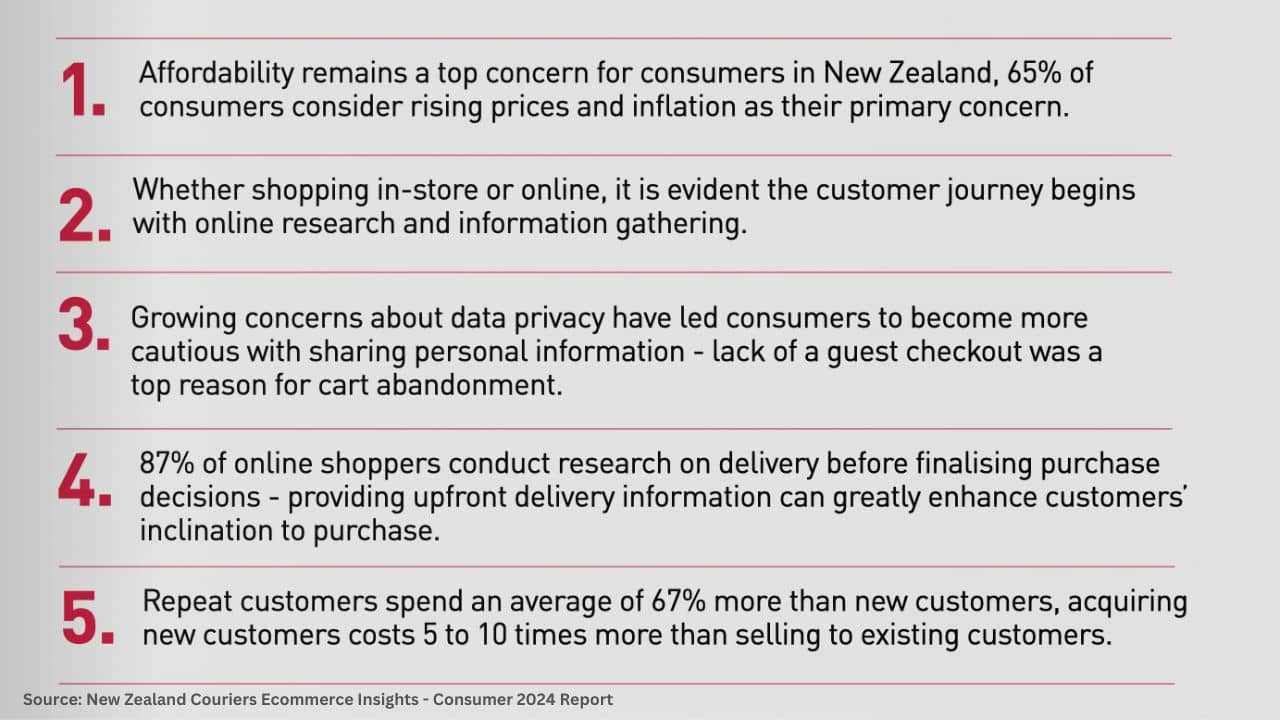
Seize the Digital Opportunity: Insights for Online Retailers
4-minute read
Consumer behaviour is changing, urging businesses to understand evolving preferences, habits, and expectations in the digital era.
The pandemic has expedited this shift, particularly in tech-driven interactions.
As online retail competition intensifies, businesses must stand out by offering unique experiences and value propositions.
Reliable deliveries are also crucial for customer satisfaction, emphasizing the importance of delivery partners.
Insightful report from New Zealand Couriers Ecommerce Insights – Consumer Report 2024 empowers businesses to understand e-commerce opportunities, implement effective strategies, and make informed investments.
Despite challenges like rising prices, online shopping continues to grow due to its convenience and value.
As such, the report highlights that by staying ahead of consumer preferences and leveraging growth opportunities, businesses can thrive in the digital age.
Current Trends

Online Trading Continues to Grow
Report highlights that affordability is a major concern for Kiwis with 65% of consumers considering rising prices and inflation as their primary concern.
Despite these economic challenges, online shopping continues to grow in popularity due to its convenience and value.
Post-pandemic, there’s been a surge in online trading, prompting Kiwi businesses to prioritize e-commerce.
The convenience of 24/7 shopping, better prices, and value-driven preferences drive this growth. High-volume shoppers and younger consumers, particularly, are drawn to online sales to satisfy their shopping needs.
In New Zealand, the number of e-commerce businesses has risen to 12,294 as of 2023, an 8% growth from the previous year.
With a projected annual growth rate of 14.48%, by 2027 the total amount of digital payments is expected to reach NZD 36.6 billion (from a 2023 base of NZD 21.3 billion).
Shoppers Do Their Research
According to the report, when it comes to searching for product information, Google remains the go-to source for Kiwi consumers.
81% of retail shoppers will conduct online research before they commit to buying an item, and similarly, 78% of internet users will use social media to gather information about a brand.
Older Kiwis place more reliance on customer reviews compared to their younger counterparts.
However, for the younger generation, who primarily use Facebook and Facebook Messenger as their top social media sources, it is evident that family, friends, and acquaintances still hold significant influence as trusted sources of information.
While the methods of sourcing external social information may vary across generations, the importance of reviews remains consistent.
User Privacy
The report underscores concerns about data privacy, which prompts consumers to be cautious with personal information sharing, leading retailers to face challenges in engaging audiences.
50% of respondents said they do not share any more personal data than necessary.
As such, it is highly important for merchants to not only provide convenient and reliable services through their own websites but also to prioritise data privacy and security.
The findings of the report show that the lack of a guest checkout on eCommerce websites was a top reason for cart abandonment, as many consumers are no longer willing to create accounts across multiple websites.
Sustainability
The report highlights a clear trend towards increased sustainability, as consumers increasingly value environmentally friendly options.
Kiwis have a growing desire to adopt sustainable lifestyles, with 85% of respondents emphasising the importance of environmentally friendly or recyclable packaging.
Other studies cited in the report have revealed that half of Kiwis have stopped purchasing certain products or services due to their negative environmental or societal impact.
While it is evident that this awareness may not always translate into immediate action, it undoubtedly influences a change in purchase action.
Global studies show that products with ESG-related (Environmental, Social, and Governance) claims tend to experience faster growth compared to those without such claims.
Recognising that the customer experience encompasses the entire product offering, it becomes evident that integrating sustainability measures within delivery partnerships can bring significant advantages to merchants in terms of expanding their business.
What Consumers Want
Despite significant shifts in the retail landscape, it’s evident from the report’s findings that consumers still prioritize reliability when it comes to delivery.
For merchants sending a high quantity of parcels, live tracking of deliveries is becoming increasingly important.
Recent data also suggests that compared to 2021, a larger number of Kiwi consumers are now willing to pay additional fees for services, with over half paying a delivery fee for their selected standard delivery on items.

What’s Driving the Shift to Online?
The pandemic acted as a catalyst, forcing many consumers to try online shopping for the first time and realise its convenience and benefits.
The ability to shop 24/7 is a significant advantage to online shopping, allowing consumers to make purchases at their convenience, irrespective of store operating hours.
Additionally, nearly half of high-volume online shoppers cite price as a major factor driving their shift towards online shopping.
Discounts, promotions, and the ability to compare prices across different platforms contribute to the appeal of online shopping for price-conscious consumers.
Significance of Delivery Options
When it comes to consumer preferences, standard delivery remains a preferred choice. However, for considered purchases, Click & Collect emerges as desirable, particularly among male consumers.
On the other hand, female consumers tend to lean towards making impulse purchases, showing a higher preference for standard delivery.
This insight highlights the importance of tailoring delivery options based on the target demographic to maximise customer satisfaction and drive sales.
Transparency
Report findings show that 97% of Kiwi consumers value accurate and up-to-date parcel tracking as highly important but are seldom willing to pay for it.
It appears that Kiwi consumers have become accustomed to receiving up-to-date tracking information from larger businesses without incurring any additional costs.
As a result, they now expect the same level of service from smaller businesses as well.
In conclusion, the landscape of consumer behaviour is continuously evolving, especially in the digital era accelerated by the pandemic.
Businesses must adapt to these changes by offering unique experiences, prioritizing reliable deliveries, and understanding consumer preferences.
The insights provided by the New Zealand Couriers Ecommerce Insights – Consumer Report 2024 are invaluable in navigating shifting consumer trends, empowering businesses to implement effective strategies and prioritize partnerships and operational upgrades.
By staying ahead of trends, fostering strategic partnerships, and embracing sustainability, businesses can not only meet but exceed the expectations of today’s consumers.
Source: New Zealand Couriers Ecommerce Insights – Consumer 2024 Report. The full report can be found on the NZ Couriers website here
P.S. Easy Freight Ltd helps New Zealand importers & exporters to save money on international freight and reduce mistakes by guiding how to comply with Customs and biosecurity rules.
➔ Contact us now to learn how we can assist you.
